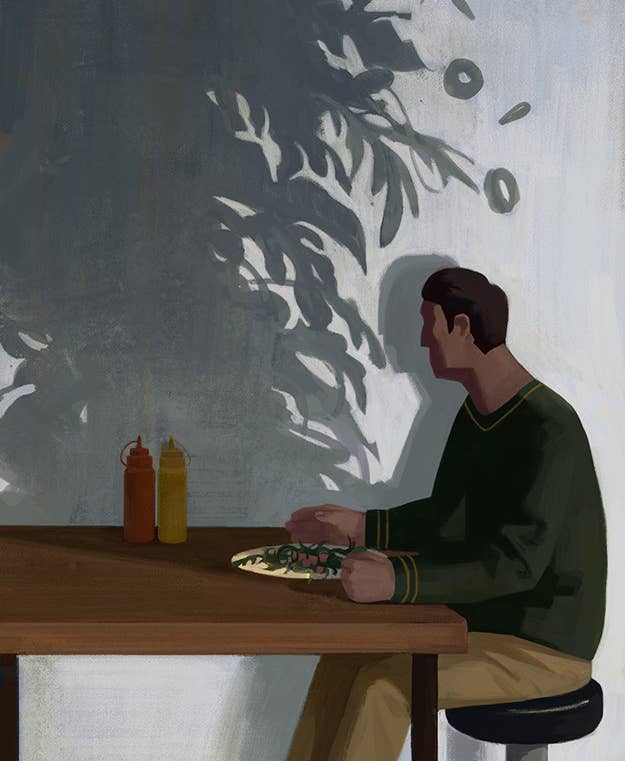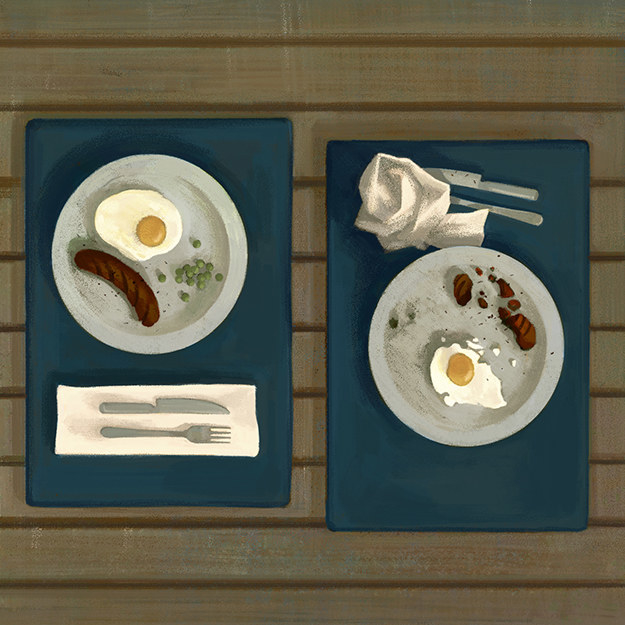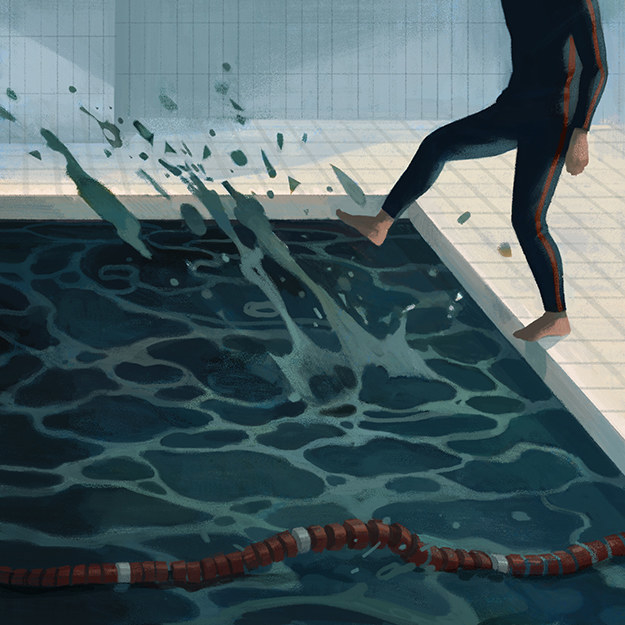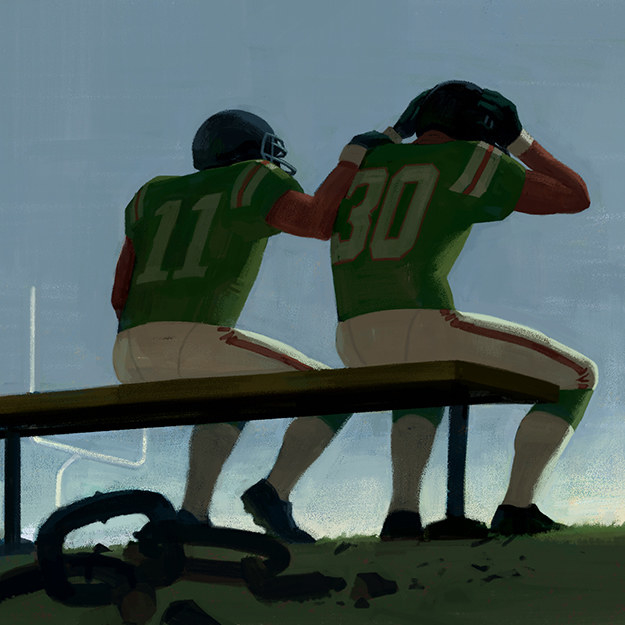
We asked men in the BuzzFeed Community to tell us about what it's like being a guy with an eating disorder. Here's what they had to say.
And just a warning: The following stories contain graphic material and should not be used as substitutes for diagnosis, treatment, or medical advice. If you feel like you might have an eating disorder, talk to a doctor or reach out to the National Eating Disorders Association at (800) 931-2237.
1. "No one realized I had a disorder, and they didn't believe me when I told them."
"My eating disorder began when I was in the 7th grade. I had self-esteem issues, I was in middle school, and I was 1/3 of my way through puberty. I hated my body. I was also dealing with other issues at the time, like friend drama, questioning my sexuality, and anxiety and depression.
I started to skip meals — mainly lunch, because that was the easiest. Then I started to skip breakfast and began to eat very small dinners. I would work out every day for hours. If I ever gained a pound, I would have an anxiety attack and cry myself to sleep. It wasn't till 8th grade when I started to explore bulimia and its effects. I wasn't bulimic for very long because it was too difficult to keep it a secret. But to this day if I eat even an average amount of food, I want to throw up.
No one realized I had a disorder, and they didn't believe me when I told them. My sister thought I was doing it for attention and trying to be 'cool.' It was very depressing knowing no one believed me. The worst was when they said 'It probably isn't that bad, anyway.' Now that I'm recovering, I'm trying to teach others that men do go through these issues and you should never shut them down when they step forward about it."
—Isaac
2. "I became frustrated if I didn't lose weight every day, and angry at those who wanted me to eat."
"I felt like I was overweight and it was disturbing for me. In a few short months, I lost weight by eating less food each day. But this weight loss caused an unhealthy obsession. I began tracking the calories I ate, not caring about anything else other than lowering my intake as much as possible. This led me to refuse going out to restaurants as I was fearful of eating too much and gaining a single pound. I slept less. I became frustrated if I didn't lose weight every day, and angry at those who wanted me to eat. When I hit a low point, my family and friends began to notice, and it became satisfying to hear people say how thin I was. I believed that it was nothing more than a compliment and not a sign that I needed help.
Eventually, I was able to train myself (with the help of others) to eat foods that allowed me to be a healthier version of myself. I still weigh less than I probably should, but I am slowly crawling out from beneath the crushing weight of an eating disorder. I know some will argue that since I've never been formally diagnosed, I can’t really say I had an eating disorder. But I’m here to say that when 99% of your day is focused on not eating or figuring out how to avoid eating just to lower your caloric intake, you don't always need a diagnosis to know that an unhealthy relationship with food has turned potentially deadly."
—Anonymous
3. "Everyone accused me of being on drugs, but I stayed silent. I'd rather them think that than know the truth: that I was bulimic and anorexic."
"As a guy, I never thought I would struggle with an eating disorder. It first started 11 years ago after my first boyfriend told me I needed to lose weight and played with my beer belly. After we broke up I lost a lot of weight. I was running 5 miles a day in 90-degree heat, wearing multiple sweat suits, a winter hat, and winter gloves. I definitely wasn't getting enough calories. Everyone accused me of being on drugs, but I stayed silent. I'd rather have them think that than know the truth: that I was bulimic and anorexic. I got better for a while, but last year I started starving myself again. For the first time I spoke up, and told my current boyfriend, my family, and even some friends. It's tough to not have a daily calorie count in my head, and sometimes it feels overwhelming. People see me eating and think I'm fine, but little do they know I might only be eating in front of them."
—Josh V.
4. "It's a process of reworking my brain and standing up for myself. But I am committed to becoming stronger and taking care of myself, so it's a plunge I'm going to have to take."

5. "I was an impressionable teenager, and I really wanted to look like this one specific musician."
"Before I was out to anyone as trans, I struggled with anorexia. I was an impressionable teenager, and I really wanted to look like this one specific musician. I remember thinking, 'If I want to look like a guy, the only way I'll be able to is if I look like him.' He was really feminine — long brown hair, brown eyes, and his height and posture, too. About a year later when I saw him on stage at Warped Tour, I only noticed his thin wrists, long legs, the gap between his thighs, and that when he took his shirt off, I could count his ribs from behind four rows of people.
At my lowest, I'd eat a very small breakfast, throw away lunch at school, and eat dinner with my parents in the evening. I started trying to eat better when I fainted in the hallway at school. No one noticed except my best friend, who promptly dragged me to the bathroom and asked me what was going on. I tried to explain, and when she didn't understand, I told her I was trans. She asked what that had to do with it, and I pointed to the band t-shirt she bought at Warped Tour and said I wanted to look like that musician. She talked some sense into me and I started eating three healthy meals a day and a snack after school. The problem with this was that my body wasn't used to the sudden increase in calories, and in three weeks I gained some weight.
My parents flipped out and said, 'No one will marry a fat girl.' They put me on a higher-calorie diet for six months and then tried to change it, but I was so used to it that I stayed on until I moved out. Now, I'm a 5'3", 120-pound man with a beautiful husband and amazing, accepting in-laws that gladly took me in as their own family when my parents disowned me."
—Spencer
6. "My 'slim' frame is too scrawny for men's societal expectations, but it isn't skinny enough for my own."
"I've had an undiagnosed eating disorder since I was 14. My coworkers, especially the other men, give me crap about needing to bulk up for my wife, but that's as far as any conversation about my eating habits or weight ever go. My 'slim' frame is too scrawny for men's societal expectations, but it isn't skinny enough for my own. It amazes and saddens me that I've been able to get away with this behavior for so long."
—Jay
7. "Admitting it to myself was horrible. Saying the word made me sick. I was stuck inside of my own mind, guilt and shame ate me alive, and it felt like I was completely alone with this feeling."
"I didn't even realize I had an eating disorder for a while. I had myself convinced it was just a phase and I could stop whenever I wanted, but when it got to the point of binging and purging multiple times a day, and hiding food in my room, I finally realized I was bulimic. Admitting it to myself was horrible. Saying the word made me sick. I was stuck inside of my own mind, guilt and shame ate me alive, and it felt like I was completely alone with this feeling."
—Anonymous
8. "I was so obsessed with fitting into what I thought was expected of a slightly more feminine gay man."
"I'm a gay man living in New York City. When I went to high school in Manhattan, I had just come out. It was scary and incredibly stressful. I was so obsessed with fitting into what I thought was expected of a slightly more feminine gay man. I started purging and using drugs to suppress my appetite. It finally came down to me using heroin, mostly to not withdraw, but also to maintain my weight. I've been sober a few years now and still get very self-conscious, but have definitely learned to live a better life."
—Robert
9. "I took a scale test in some health book (later proven to be a scam) and it told me I was on the verge of obesity. I started dieting the same day."

10. "The toughest moment was opening up to my girlfriend — mostly because it was embarrassing being a 25-year-old guy with what people tend to see as a girl's disorder."
"After I came to terms with what was going on, the toughest moment was opening up to my girlfriend — mostly because it was embarrassing being a 25-year-old guy with what people tend to see as a girl's disorder. It just adds more stress to deal with something and also have to hide it every day for the sake of seeming both 'manly' and 'not crazy.' It took months to figure out when and how to tell her.
Now that it was personal, she also seemed to change how she talked (and joked) about things like body image, gender, and stereotypes. We're married now, and I've been getting help for a couple of years. And although we rarely talk about it, knowing she's there for me with no judgment keeps me going."
—Anonymous
11. "It seems I jump from one disorder to another regardless of where my life goes."
"I'm a binge eater, especially when I'm depressed. Simple as that. I would rather eat than cry. Spending the last decade to build an emotional wall around me caused me to turn to food as a means of comfort. As a young boy, though, I was the opposite. Being called a fatty at a young age made me bulimic at 11, I was scrawny and weak and had no energy. It seems I jump from one disorder to another regardless of where my life goes. It's just the kind of attitude that utilizes food to fit my emotional needs no matter what they are."
—Marv
12. "It makes me sad and no one really understands that part."
"I turned 28 today and I have had an eating disorder since I was 13. I can't even enjoy popcorn at the movies without the feeling like throwing up because I've destroyed my digestive system. It makes me sad and no one really understands that part."
—Andy
13. "I feel like I'm unfairly cheating the system when I talk to girls with eating disorders."
"I feel like I'm unfairly cheating the system when I talk to girls with eating disorders. I've been able to maintain an abnormally low weight and restrict my diet because teenage boys are supposed to be skinny... 'Oh, he's just a picky eater.' I wish someone would reach out and ask, 'Hey, are you okay?' I'd probably break down in their arms right then and there."
—Anonymous
14. "When I showed up at the hospital, I was covered in sweat, my eyes were bloodshot, and I was in fetal position with a distended abdomen."
For about two years I had been cutting calories and restricting and purging. I had been to the ER twice before, but during my freshman year of college, I was taken for the third time. I was in the shower and I bent down to grab my shampoo when I started dry heaving. I tried to stand back up but my entire body felt like it was cramping. I crawled out and my roommate called 911.
When I showed up at the hospital, I was covered in sweat, my eyes were bloodshot, and I was in fetal position with a distended abdomen. My heart felt like it was being torn in half and my beats per minute were incredibly low. They had me on an IV drip with potassium, which was on of the most painful experiences of my life. One of the nurses suggested I eat — possibly one of the worst things she could've said to someone in my situation. I had gotten to the point where my stomach was so small that even a bagel hurt to have inside me. My teeth were weak, my hair was falling out, and my nails were dented and scratched. I couldn't 'just eat.'
When I was finally ready for treatment (about a month later), I wanted to be in a facility. But so many of them are women-only. It's really great that they have these spaces for women to get better and focus on themselves, but honestly, I'm not sure how separating the genders helps anyone. We're all there for the same reason. Ultimately, I had to put together my own team of a doctor specializing in EDs/drug addiction recovery, an ED specialist (therapist), a general therapist, and a registered dietitian/nutritionist. It was really a tough time, and 13 months later it continues to be a struggle to feel as healthy as I once was. It gets easier every day, thanks to the support of my family, friends, and doctors, but I wouldn't wish it on anyone."
— Aleckxi
15. "I played football all throughout high school, so I was athletic and in decent shape. Not ripped or anything, but not unhealthy. For my girlfriend at the time, that wasn't OK."

16. "Are there times when I eat too much, maybe even to the point where it's considered a binge? Yes. But they are few and far between, and I know that there is so much more to life than what I put in my stomach."
"For me, the biggest problem was the initial positive feedback. I had always been a little overweight, and when I began eating more health-consciously, it worked, and I began to slim down. People noticed, and their compliments became an addiction. I loved hearing things like, 'Have you lost weight?' and 'You look great now!' So much so that I strove to continue to change my appearance. I told myself that what I was doing was healthy, and for my own good. I wasn't skipping meals, so my parents weren't too concerned. However, my obsessive exercising and calorie counting led to far less caloric consumption then what I needed as a 16-year-old teenage boy. I didn't realize it at the time, but my habits began impacting my entire life. My workouts, which had started out as something completely positive for my body and mind, became a war with my body to burn as many calories as I could. Eventually, I came to terms with the fact that I had a problem, but that didn't change my habits much. I told people that I was trying to gain weight, but I was so concerned that I would gain it all as fat that I really was not trying at all.
Then the binging began. There were nights when I would come home and, with the rest of the family asleep, I'd eat everything in sight, especially the foods that I had so religiously denied in previous years. After every binge, I would break down into tears, hating myself for what I had just done. More often than not, my crying would wake a parent, who would try and console me, telling me that it was probably just my body trying to gain back what it had lost. It wasn't until I got professional help that I realized they were mostly right. Thanks to their love and support, I can happily say that I made a near-full recovery. Are there times when I eat too much, maybe even to the point where it's considered a binge? Yes. But they are few and far between, and I know that there is so much more to life than what I put in my stomach."
—Jacob
